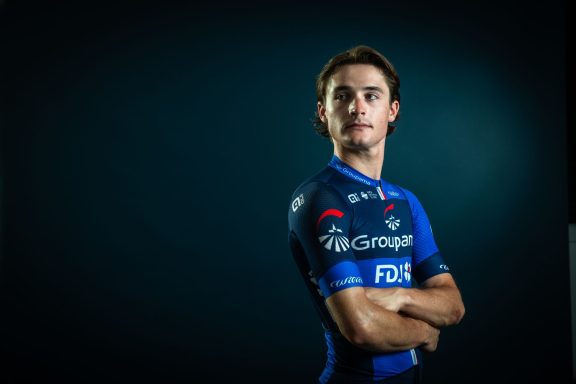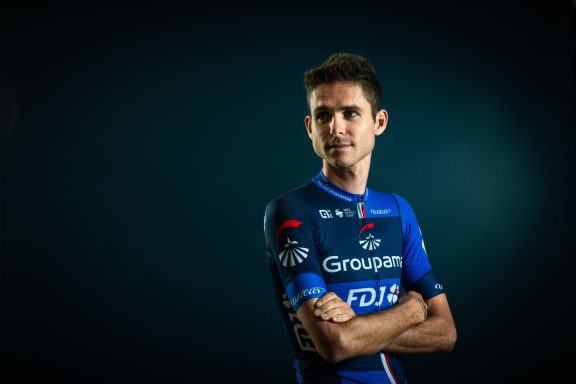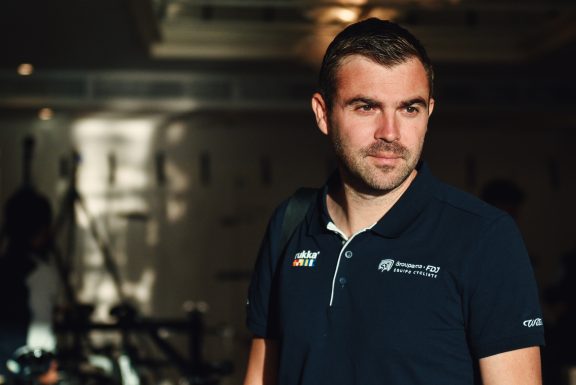He will be one of the “elders” of the Groupama-FDJ development team in 2024. 20-years-old Brieuc Rolland is about to start his second season with the French squad, and his third within the U23 ranks. He aims to continue his gradual progression, which he tells us about deeply in this new feature.
As if being from Brittany wasn’t enough, Brieuc Rolland was born on September 13, 2003, in a family already passionate about cycling. His way couldn’t go in another direction. He quite naturally followed the footsteps of his father, an amateur rider, and his brother, seven years older than him. “I remember we would go see my dad race all together,” he says. “These are quite distant memories because he didn’t race for a very long time, but I still remember seeing him win. I was also going to see my brother in the Junior races. I was really into it from a young age, and I have always been passionate about competition.” Brieuc was just five years old when he really started cycling, through mountain biking. At first, it was just a hobby, but he then entered a club after moving out from Rennes to Morlaix at 7-8 years old. From then on, he tasted racing and acquired a “good regional level” over the seasons. “I took part in the FSGT races, which are not very big races”, he says with perspective. Among this group, I was quite often in the top 5. Even though they weren’t French Federation races, I was doing ok.” For several years, mountain biking remained his only activity on two wheels, but not his only sports. “Alongside, I did other sports to let off steam, such as running, swimming, tennis or even gymnastics, but my favorite sport has always been cycling,” he adds. Actually, no other sport kept its interest for more than two or three years.
From mountain biking to road cycling (and its risks…)
As for his practice of cycling, it only evolved during his teenage years. “I might have done one or two road races in my first year under-14,” he notes. “I liked it, but I was terrible (smiles). I continued to do mountain biking in my second year U14, then when the MTB season ended, I did some road races again. It went better, I liked it, and I no longer did mountain biking among the U16.” At 15, Brieuc Rolland left the forest tracks to try the asphalt. The transition took place gradually, without sudden performances, but with complete passion. “It was very different, but I liked the feeling of speed, riding in a group,” he says. “I quickly got caught up in the game. And then, I had already ridden all the paths around my house. Taking the road bike allowed me to go a little further, to discover other landscapes. In my first year as a U16, I was never very great, but I was doing my own race. I weighed less than 50 kilos at the time, so it was difficult for me whenever it went very fast. I had growth retardation, but I was doing what I loved.” His journey continued in his second year in the category. He picked up two victories and faced a higher level on the Madiot Trophy, where he took third place in Laval during the final round and ranked tenth overall. “I really liked these races because I could see what the level was outside of Brittany,” he said. “We were going there with my father and those were our goals. These are reference races, and I was already happy to obtain these results.”
At the time, he was already thinking about professionalism. “Actually, since my first year on the road, I dreamed of making it my job,” he confesses. “I always did everything I could, hoping that one day it would be possible.” In order to fulfill this dream, he joined the UC Briochine, in Saint-Brieuc, when entering the juniors ranks. Yet, this 2020 season was obviously very disrupted by the pandemic, but also by a personal road accident. “I think it was my first or second ride after the lockdown, and I was hit by a car while I was on my time trial bike,” he says. “I vaguely remember it. I saw the car slip in while it shouldn’t, and I hit it head on. With the time trial bike, I barely had time to put my hands on the brakes and I found myself on the windshield. It was a shock for my parents. For them, it wasn’t easy to think that I was going to go back to riding alone. The accident could have been dramatic, but at no time did I tell myself that I was going to stop.” Despite his misfortune, the young Breton escaped major injuries. He suffered various migraines due to the concussion, but no other after-effects were recorded. This also meant that he wouldn’t miss the “restart” of the season, planned for later in the summer. “When the doctors gave me the green light, I resumed a more or less normal training sequence,” he continues. “We went with my father to Argelès-Gazost, in the mountains. It did me a lot of good. I certainly lost a bit of time with the accident, but I didn’t really care at the time. I was just happy to be able to get back on the bike.”
A second, revealing year in the juniors: “Maybe I have potential”
The short end of the season did not allow him to get himself noticed, and his ambitions were thus postponed to the following year. To the following spring even. Not having the status of “high-level athlete”, he did not have the possibility, unlike other junior riders, to take part in elite races. His return to competition therefore did not occur until the end of May (!) “The preparation was very long, I had to stay motivated, and I was 100%,” he says. “When the Brittany federation announced that they were organizing a selection race for the Classique des Alpes, I saw it as a wonderful opportunity. I was extremely motivated, but I didn’t know what my level or the others’ were. In the end, it went very well. I did the race in front with Pierre Thierry, I finished second and got selected. It was the starting point of a great season. That race kind of launched it all.” In the Alps, Brieuc Rolland obtained a solid fourteenth place, which came as a slight surprise. “I hadn’t done any mountain in preparation,” he explains. I lived in Brittany, so it was a bit complicated.” He followed this up with a third place in the Trophée Sebaco Juniors, some good results at the Tour du Bocage et du Ernée 53, and a silver medal in the Côtes-d’Armor championship. All this earned him, at the beginning of July, a selection… for the French national team this time. “When I was called for the training camp in Maurienne before the Valromey Tour, it was incredible,” he says. “I was going to wear the national jersey, I had been chosen from a good number of riders, and I thought that I wasn’t that bad eventually. It kind of clicked.”
His successful summer continued with a fifth place in the French championship, a first victory in Saint-Laurent, in Normandy, then a fifth place in the Ronde des Vallées and a second in the Grand Prix KBA-Vérandaline. This allowed him to join the French team again for the Giro Lunigiana, alongside a certain Lenny Martinez. “I was super happy to be selected for this race, we were happy to reunite with the other guys, then came this first, quite crazy stage,” he adds. “We broke away with Nicolas Rousset-Favier and we didn’t think too much. In the end, I found myself alone, I rode hard, and I got to win this first stage. I was the first one surprised. Winning with the French team jersey was crazy, but I was super happy.” On this occasion he scored his first major result on the international scene, then turned himself into a domestique for Lenny Martinez who won the overall, while securing sixth place. He also supported the young climber and Romain Grégoire a few days later at the European Championship won by the latter, and finally concluded his year with a fourth place overall in the Saarland Trofeo, another benchmark event among Juniors. “These results, and my victory in particular, further strengthened my desire to be a professional cyclist,” he says. “Until then, it was “small results”, but after performing in these races, I said to myself: “Maybe I can do something. Maybe I can move to the next level. Maybe I have potential.”
“A great change” at La Conti
This potential was spotted by several teams, and the young Breton chose the Vendée U for his first year in the U23 ranks in 2022. Given his calendar, he especially had the opportunity to show himself at the amateur level. He won in Redon on home soil then on a stage of the 3 Jours de Cherbourg, while adding a few top-10s here and there, including a fifth place in the French championship. His few international appearances are a little more discreet. “I wasn’t at my best in the .2 stage races, but I was happy with my year and my progress,” he claims. “We had a great team and I learned a lot in this team, both on and off the bike. This first year U23 among the Amateurs did me a lot of good.” During the summer, talks with the Groupama-FDJ’s continental team were initiated, and were finalized fairly quickly. “I told myself that “La Conti” was one of the biggest development teams at the moment and that it would enable me to make a big step forward in all areas,” he explains. “I wanted to work in the mountains, to work differently, to see something different, and to really pass a milestone. I obviously asked myself the question of continuing with Vendée U, because they had given me a chance, but in the end, I did not hesitate for too long to commit to La Conti.” On January 1, 2023, his dream of becoming a pro rider became a reality. Only partly though, as “La Conti” should only be an intermediate stage before the very high level.
This new step forced him to “find himself away from home for the first time”, and also led him to put his studies on hold. “I had started a Degree in Economic and Social Administration, and it turned out that I really didn’t like it at all,” he explains. “I didn’t make a very smart choice. So, when I signed with La Conti, I told myself that I was going to give myself 100% for that so as not to have any regrets.” In Besançon, the team’s headquarters, sharing accommodation with his new teammates helped with acclimatization, and having all necessary tools and people “nearby” came as a privilege to him. He only needed for the season to start. “It was clearly a big change for me,” he says. “It went very well over the winter with my coach, and I felt like I was progressing. When the first races came, I felt like I was a first year U23. It was a real discovery, I didn’t really know where I stood at that level, but everything went well.” After a month of competition, he actively contributed to the team’s first victory, taken by Thibaud Gruel on the third stage of the Circuit des Ardennes. “This race was a bit crazy, nothing went as planned, we got a bit overwhelmed,” he says. “But no one gave up. Thibaud came to see me and said: “I’m on the limit, we’re riding for you.” I told him that I was on the limit too (laughs). I told him: “Trust yourself, it can work on this kind of effort.” It was one of the very beautiful and strong moments of the season.”
Consistency in the mountains, but hoping for more
He personally finished fourteenth in the general classification, then didn’t prove “opportunist” enough on his regional Tour a few weeks later. “The Tour de Bretagne is a race that favours the attackers, and I didn’t dare enough,” he admits. “It was a great lesson. It helped me a bit for the Alpes Isère Tour. I didn’t want to come back to Besançon with regrets. On the last stage, I tried to follow when the two best riders attacked, and we went full gas for 50-60 kilometres. This allowed me to take sixth place in the stage and overall. It was not a podium, but I was already happy with this performance because it was the first really mountainous race of the season.” On his following appointment, also the most prestigious of the year which is the “Baby Giro”, he took a decent thirteenth place overall. The following month, still on the other side of the Alps, he entered the final top-10 of the Giro della Valle d’Aosta (8th) while getting a podium on the first stage (3rd). “I was satisfied, even if I had lost a little confidence in myself for this race, and I did not try enough,” he explains. “This could have helped me get closer to the top-5. But when I look back, I finished 32nd the year before, which means that I already passed a milestone and that bodes well for next year.”
His second part of the season included two top-10s in the U23 French championships, a participation in the Arctic Race of Norway at Pro Series level, but above all, an unforgettable experience alongside Thibaut Pinot, David Gaudu and Stefan Küng on the Tour of Slovakia. “When I was told that I was going to race with this team, I thought it was crazy,” he adds. “I was super happy to be able to meet them. In the end, we watch them on TV, but they have the same passion as us. I realized that anything was possible. I learned a lot that week, I tried to gain as much experience as possible, and I can say that I raced with Thibaut (smiles).” A rider, among a handful of others, who he “obviously looked up to” growing up. First because he’s French, but above all because he’s a climber, which he tends to be too. “For the moment, I’m a little more of a climber than a puncher, although I want to keep that finishing kick,” he adds. “Yet, above all, I must progress in the mountains to turn my top-10 into top-5, podiums or even victories. I also have to continue working on the time trial, because we know that it is super important for the general classifications nowadays.” In the long term, he hopes to stand out in Grand Tours and hard stage races. In the short term, this will lead him to repeat a program almost similar to that of 2023 for his second season in “La Conti”. “Like everyone, my big goal now is to enter the WorldTour team,” he concludes. “It became my priority. I hope to have the opportunity to compete again with them in hard races to show what I am worth and continue to progress as I have been doing for several years, at my own pace.”




No comment